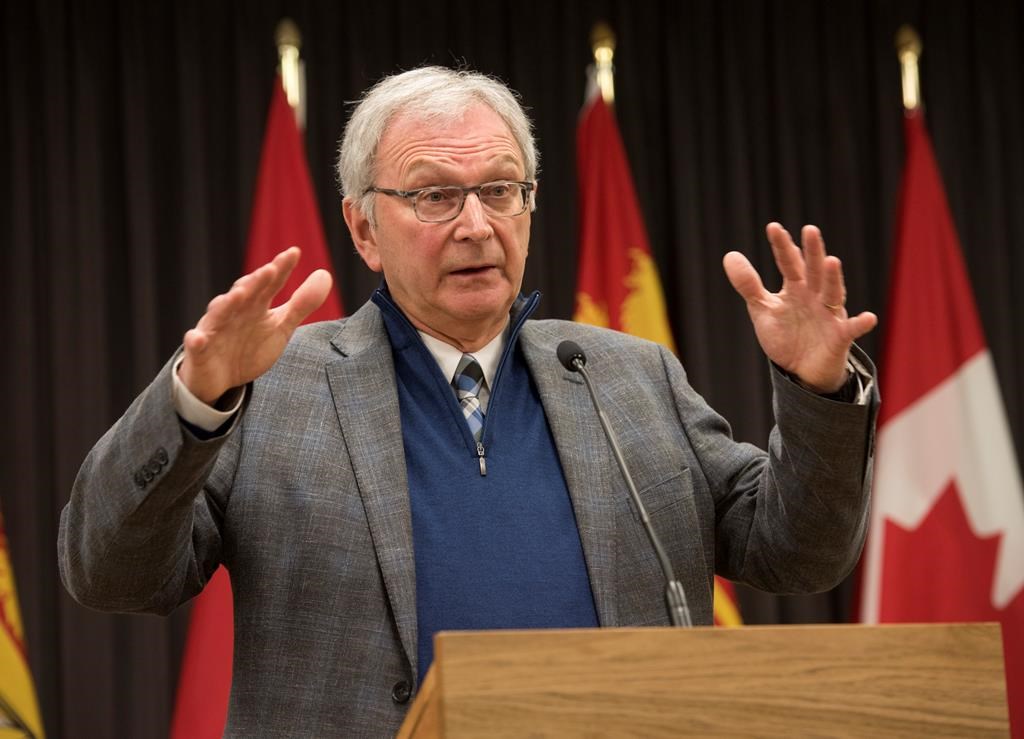It was two days before Christmas 2018 when New Brunswick Premier Blaine Higgs, in a live interview with me, spoke of the need to determine if Canada is a nation or a notion.

More than one year, one Alberta and one federal election later, the question not only lingers, but has increased in scope and significance.
READ MORE: Kenney says Trudeau government sank Teck mine with deadline change, but Ottawa says ‘not true’
At the time of my interview with Premier Higgs, he had just attended his first national premiers meeting. The Energy East pipeline project was still of sufficient national interest at that time that its need and possible feasibility entered the conversation.
So did the equalization formula and Quebec’s growing entitlement to receiving increasing billions of annual equalization dollars while simultaneously that province, through its Premier Francois Legault, bluntly shuttered all talk of any new Quebec-crossing pipeline construction linking the Alberta oilsands with refineries in New Brunswick.

Much has changed.
Next week, as the nation’s premiers meet with Prime Minister Justin Trudeau, Alberta Premier Jason Kenney will raise the need for change to the current equalization formula and demand the federal government support, instead of impede, development of the energy sector in his province.
Trudeau dragged his heels on delivering federal support for the $20-billion-plus Teck Frontier oilsands mine in Alberta, causing the company to walk away after spending more than $1 billion to meet environmental assessment and regulatory requirements, as well as garnering support from all First Nations directly to be affected.
Trudeau’s distaste for the oilsands is clear and was spoken to directly by the prime minister in a town hall meeting televised nationally.
LISTEN BELOW: The Roy Green show from March 2
Yet China, the world’s greatest emitter climate-impacting pollution, forges onward building massive new coal-powered energy plants.
How does the Trudeau government respond? By challenging Beijing vigorously? Not so much. Instead, Ottawa greenlighted China National Offshore Oil Corp’s (CNOOC) exploration in the waters off the Newfoundland and Labrador coast.
The government of Newfoundland and Labrador is welcoming the development and why wouldn’t it? The provincial natural resources minister said, “this means jobs created for the people of our province and growth in our oil and gas industry.”
Alberta’s oilsands, though, retain Ottawa’s pariah designation as jobs and billions upon billions of dollars are lost not only to Alberta’s treasury but also to all of Canada and our complex and expensive social infrastructure.
Energy to be produced by state of the art Canadian technology, then shipped to nations without the infrastructure or tech to match, means natural resources will remain in the ground.
Last weekend, I spoke on air with Laura Lau of Brompton Corp. in Toronto. Lau manages some $2 billion in assets and spoke of the withdrawal of the Teck Frontier mine initiative as the perhaps last nail in the coffin of investor oilsands development interest.
That’s not all, of course.
Most recently, rail line blockades and interruption of vital national commerce have been allowed to proceed at great cost to Canada by Trudeau’s “timid” response to law-breaking — “timid” was the assessment of University of Saskatchewan professor and Indigenous issues expert Ken Coates on air. Not just once, but twice and on successive weeks.
COMMENTARY: If Canada is a nation of laws, we should enforce them, Roy Green says
- Life in the forest: How Stanley Park’s longest resident survived a changing landscape
- ‘Love at first sight’: Snow leopard at Toronto Zoo pregnant for 1st time
- Carbon rebate labelling in bank deposits fuelling confusion, minister says
- Buzz kill? Gen Z less interested in coffee than older Canadians, survey shows
There will be much to challenge the premiers and prime minister at their meeting. Trudeau will be lobbied to remove his government’s imposed carbon tax until the Supreme Court of Canada decides whether Ottawa has the constitutional power to so decide. Kenney will have the Alberta Court of Appeal on his side, as the court just days ago decided the federal government overstepped with its carbon tax imposition.
Add to the above that for decades, provincial trade barriers impeded national economic cooperation and growth.
Is Canada a nation or a notion?
LISTEN BELOW: Blaine Higgs on Roy Green’s show in December 2018
Roy Green is the host of the Roy Green Show on the Global News Radio network.
Listen to the latest from the Roy Green Show
Subscribe to the Roy Green Show Podcast now at Apple Podcast or Google Play




Comments